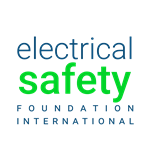ARLINGTON, Va., June 05, 2025 (GLOBE NEWSWIRE) -- As life-threatening storms continue to strike with increasing frequency and severity year over year, a growing number of people will be impacted by hurricanes, lightning, tornadoes, and other hazards. Preliminary hurricane forecasting indicates another above-average hurricane season in 2025.
Post-storm electrical hazards are frequently responsible for deaths and injuries during the summer months. The high winds, extreme rains, and devastating flooding caused by hurricanes and tornadoes present unique electrical dangers, and those living in affected areas should be aware of these hazards to keep themselves safe.
The Electrical Safety Foundation International (ESFI) has published numerous materials in recent years educating the public on how to prepare for hurricanes and other severe storms. This release provides safety tips related to hurricanes, flooding, portable generators, and lightning.
Hurricane and Flooding Safety
Hurricane season in the U.S. runs from June through November and most significantly impacts coastal southeastern U.S. states. Flooding is a concern associated with hurricanes but is not limited to hurricane events or coastal areas. Flooding can occur anywhere, and all 50 U.S. states have experienced floods or flash floods in the past five years. Water and electricity do not mix, but there are precautions you can take to stay safe before, during, and after a hurricane, severe storm, or flood:
- Before a storm, follow directives, if any, to turn off your home’s utilities. If you are advised to switch off your home’s power, flip each breaker and then turn off the main breaker. Charge cell phones and other communication devices and unplug electronics and move them as high as possible from the floor.
- Always use ground fault circuit interrupters (GFCIs) in areas where water and electricity may come into contact.
- During a storm, do not enter flooded areas until they are determined safe by a professional. Submerged outlets or electrical cords may energize standing water. Similarly, do not go near downed power lines, especially if there is standing water nearby. Always assume downed power lines are live.
- After a storm, if your home has experienced flooding, keep the power off until an electrician has inspected your system for safety, including appliances that have been wet.
Portable Generator Safety
Portable generators can be a useful resource in weathering a storm but can create new hazards if operated incorrectly. Here are tips on how to avoid electric shock and carbon monoxide (CO) poisoning:
- Always keep generators outside at least 20 feet away from your home and never operate a generator in an enclosed space. Keep generators away from doors, windows, and vents. Make sure your home has CO alarms outside each sleeping area and on every level of the home. If you experience CO poisoning symptoms, leave the premises immediately and call 911.
- Always use grounded cords and inspect cords for damage prior to use. Keep generators dry and do not operate when wet.
- Do not overload generators, and do not plug a generator directly into your home. Connect items being powered directly to the generator.
- Transfer switches are the only way to safely power your home’s electrical system. Using a transfer switch prevents backfeeding. This occurs when your generator becomes a power source for the surrounding area. Backfeeding can damage your and your neighbors’ homes and injure workers trying to restore power.
Lightning Safety
While direct outdoor strikes from lightning are responsible for the majority of lightning deaths and injuries, lightning can pose risks to people inside homes or other buildings. Direct or nearby lightning strikes can overwhelm a building’s electrical systems and cause damaging surges. Follow these tips to protect yourself and your property in the event of lightning:
- Surge protective devices (SPDs) are the first line of defense against home electrical surges, and Type 1 SPDs can protect your electrical system in the case of nearby lightning.
- During a lightning event, avoid making contact with anything connected to your home’s wiring or plumbing systems.
ABOUT ESFI
The mission of the Electrical Safety Foundation International (ESFI) is to reduce electrical deaths, injuries, and fires through public education and outreach and by being the trusted voice on electrical safety. For free safety materials that you can share throughout your community, visit esfi.org.
Contact:
Evan Jones
Electrical Safety Foundation International
703.841.3247
evan.jones@esfi.org


